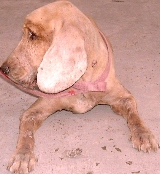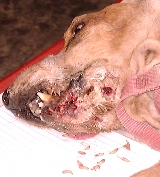The
crow catching spaniel
"No problem with this old cocker spaniel," said Groomer Ken.
"Just some antibiotic tablets and the holes on his chin will heal
while he is boarded in my boarding kennel." he told Dr Melissa Chua
with an air of confidence of a groomer who had been in this business for
over twenty years.
He had transported sick dogs to all the veterinarians
in Singapore. He had seen everything associated with dogs. The few holes
in the chin would heal in no time. With the help of antibiotics, of
course.
Groomer Ken had been asked to clip the dog's coat short and bring it
down to Dr Chua for examination. Mrs Moore, the Owner, wanted a
house-call saying that her dog had a few holes in the chin area. These
holes had been around for several days, maybe two weeks or more. The dog
was busy chasing crows in the Fort Canning Park. Crows do
nest in large numbers in various parks in the garden city of
Singapore. Could their sharp beaks have pecked this spaniel and
caused injuries to the chin area?
"Sounds like maggot infestation. It is not so simple to diagnose over the telephone," Dr Chua
had said. "If the problem could not be treated at home or required
protracted treatment, the house call charges would be very high.
Therefore, it would be best to bring the dog to the veterinary
clinic."
Groomer Ken had clipped the dog. Entangled coat emitting a foul smell.
The coat clipper got caught in the matted hair and jammed several times.
Three assistants were needed to hold down the dog. It bit whenever
it had the chance. Its mouth was muzzled and the grooming was well
done.
"No, antibiotics and grooming alone would not solve this dog's
problems" said Dr Chua.
"The signs and symptoms indicated maggot infestation of the chin
and the dog needed to be examined and maggots needed to be
removed".
Several holes which do not heal. Big holes in a dog
with freedom to roam about. Bird attacks or pecking could not be
ruled out. Any other clues?
 Now the dog
was brought to the clinic. Ken handed a hand glove to Dr Chua. It
had a foul breath and saliva tinged with blood was drooling from the
mouth. Now the dog
was brought to the clinic. Ken handed a hand glove to Dr Chua. It
had a foul breath and saliva tinged with blood was drooling from the
mouth.
"It was messy," he told Dr Chua. He had boarded it for 2 days
and had a ravenous appetite which was good news.
"It bites," he warned Dr Chua as he handed her a translucent
disposal hand glove so that the veterinarian's hand would not be
enveloped with a stench which need strong antiseptic washes to get rid
of. He was not too keen to hold the dog for a tranquiliser
injection as he had one bite too many from this veteran crow
catcher.
"Don't you welcome messy grooming cases?" Dr Chua asked Ken.
"Don't you preach to me about challenging cases and positive mental
attitudes!" Ken forestalled any modern management lectures from
this young veterinarian. The profits or the bottom line was most
important for him as Singapore's economy was in recession after
the Gulf War and more younger groomers had set up shops and slashed
charges to get business.
It took three people a long time to restrain this spaniel. Jammed
clippers and the smell was nauseating. A smell of rotten meat or
the most smelly Danish blue cheese which hit the nostrils. One
novice groomer vomited after a while and had to leave. All this
work for eighty dollars. This was a money losing case.
 The spaniel was tranquilised with an
injection into the backside muscle. It would be foolish to examine its
mouth without tranquilisers. The spaniel was tranquilised with an
injection into the backside muscle. It would be foolish to examine its
mouth without tranquilisers.
"It must be painful, that's why it bites," Dr Chua said.
There were at least five holes in the left gum of the upper and lower
jaws. White cigar-shaped worms of over 1.5 cm long were wriggling
in their entrenched positions. These were the maggots, the stage before
they turn into flies. The artery forceps were used to pull out the
maggots.
The spaniel recovered in 14 days' time. No bad breadth and no bad
body odour. It was ready to help the Singapore veterinary
authorities to keep the crow numbers down once
more. |